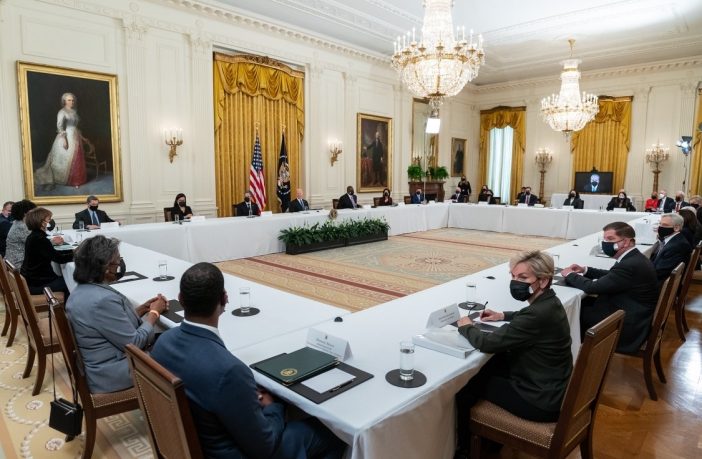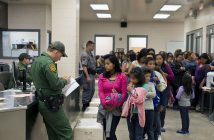For good reasons, it is often argued that personnel is policy. Just as coaches surround themselves with individuals dedicated to a common goal, President Joe Biden and Vice President Kamala Harris signaled during the presidential transition their commitment to dramatically overhauling the nation’s immigration system, with enforcement relegated to an afterthought.
Hyperbole? Well, let the appointments speak for themselves.
Having worked in Washington, D.C., for so long, it was not surprising that President Biden went back to names he knew, including Ur Jaddou, who he chose to lead of his Department of Homeland Security (DHS) review team. Well-known in immigration circles, Jaddou was chief counsel at U.S. Citizenship and Immigration Services (USCIS) during the Obama-Biden administration and most recently the director of DHS Watch at the pro-mass immigration America’s Voice. In her most recent job, Jaddou has called for a pause in funding for Customs and Border Protection (CBP). She is now Biden’s nominee for USCIS commissioner.
But what had many worried, including FAIR, were the outside the mainstream views Biden appointees held concerning issues from border security and visa reform to the hiring of foreign workers and vetting of foreign nationals.
For example, let’s look at some influential members inside the Biden-Harris administration.
DHS Secretary Alejandro Mayorkas – The former deputy secretary of DHS and head of USCIS during the Obama-Biden administration. At USCIS, Mayorkas helped facilitate the implementation of DACA and in an interview on PBS in 2017, he was asked whether he preferred a legislated amnesty for DACA beneficiaries. He said it would be a “start,” but that he “would hope that it would be even more expansive than that.”
Health and Human Services (HHS) Secretary Xavier Becerra – Along with Mayorkas, one of the nominees who FAIR publicly opposed was Becerra. As California attorney general, Becerra sued the Trump administration over its attempt to repeal of DACA; its efforts to add a citizenship question to the 2020 U.S. Census; its rule barring those who are likely to become public charge from obtaining green cards and; ironically, was a vocal critic of HHS’s use of detaining unaccompanied minors during the Trump administration – a practice his department now oversees.
CBP Nominee Chris Magnus – Currently the chief of police in Tucson, Arizona, Magnus is a vocal advocate of sanctuary policies that prevent cooperation between state and local law enforcement and federal immigration officials. He notably penned a New York Times opinion piece in which he argued that federal efforts to punish sanctuary jurisdictions would make those jurisdictions “more dangerous.” Oh, he also has no federal experience.
Secretary of State Antony Blinken — Blinken wrote a 2018 New York Times op-ed that ended by warning that “if Mr. Trump effectively shuts down the refugee program, he will be plunging the world — and Americans with it — into greater darkness.”
Blinken, who was an aide to Joe Biden when he represented Delaware in the Senate, will likely play a key role in formulating the administration’s refugee policy, which is quite confused after the Biden said he would not lift the refugee cap and then quickly reversed that position in the wake of criticism from liberal politicians and interest groups.
Special Climate Envoy John Kerry – Blinken’s boss during the Obama-Biden administration, Kerry, also a former senator representing Massachusetts, has been asserting for years that climate change is creating “climate refugees” and will be influential in making the case that the U.S. should accept more refugees based on environmental conditions in their home nations. If such policies were to be adopted, untold numbers of migrants could assert the right to resettle in the United States as refugees.
Avril Haines – The first woman to serve as Director of National Intelligence, Haines is another alum from Biden’s time on the Senate Foreign Relations Committee and also worked in the Obama administration as Deputy National Security Advisor and at the CIA.
Many of these individuals have worked with Biden and each other for decades and have grown more attached to ideology and groupthink. Consider that as the transition team members were being named, border apprehensions were continuing to trend upward…
UP NEXT: Rather than declining in December and January as normally occurs, the number of apprehensions increased 6 percent. In an article titled, “Border arrests rose in January, in latest sign of migration wave that could test Biden,” the Washington Post noted that the increase was coming in “a period that typically brings a holiday lull.”
How did newly inaugurated President Joe Biden decide to address these concerning trends on his very first day in office? Find out tomorrow…
To join FAIR’s campaign to send a message to President Biden, Vice President Harris and Congress, click here.
To make a critical donation to FAIR’s efforts to stop the Biden administration’s disastrous dismantling efforts, click here.





1 Comment
Pingback: Biden’s Personnel Picks Predicted the Path of Immigration Policy | 198 Immigration News